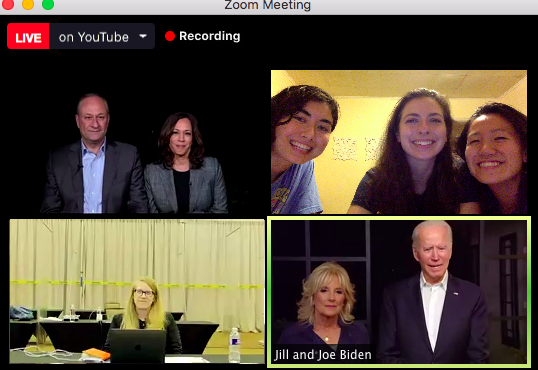By Eleanor Naiman

In 2020 Eleanor Naiman was a Biden-Harris campaign field organizer for the Nebraska Second Congressional District, working remotely to gain an electoral vote for Democrats. She is a recent graduate of Swarthmore College and completed an internship for the Bay Area Women in Politics Project with the Oral History Center in summer 2019.
Each of the 4,150 phone calls I made as a field organizer with the Biden-Harris campaign had a clear and stated purpose: to establish a voter’s support of Democratic candidates and to convince them to volunteer at a virtual phone bank. A detailed script drafted by the Biden HQ provided the framework for each conversation. Designed to maximize efficiency and recruitment shifts, the script encouraged organizers to get to a “hard ask” as quickly as possible: “We have phone banks at 4:30pm Central every day this week,” I’d explain. “Can I put you down for Monday and Wednesday?”
The direct nature of our recruitment script initially threw me off. My summer as an intern for the Oral History Center’s Bay Area Women in Politics Project taught me to take a subtler approach to questioning. I learned to ask open-ended questions that allowed narrators to tell their stories with authenticity and autonomy. I knew to prioritize the needs of my narrator over my own research objectives, working collaboratively to construct a life story that felt true to both history and memory.
In those early days of campaign work, I longed for the opportunity to sit down with each voter, as I had at the OHC, equipped with pages of notes of background research and confident in the strength of the relationship we’d built over pre-interviews and email correspondence. I missed the warmth and familiarity of in-person conversation; due to the nature of field organizing in a pandemic, the entirety of my conversations with voters took place over the phone or on Zoom. My conversations with voters seemed unpredictable and somewhat chaotic. Parents answered as they shuttled their kids to school, retirees picked up with the afternoon news blaring on a nearby TV, wives declined on behalf of husbands on the farm and in the field. I never knew where a conversation with a voter would take me. Would they hang up abruptly, perhaps after a quick jab at my candidates or an angry request that I take them off the list? Or would they linger on the phone, desperate for some form of human connection after months of pandemic-imposed isolation?
The conversations that fell somewhere between those two poles posed the greatest challenge. Somehow, in the five minutes allotted for each conversation, I needed to transform a weary voter into an eager volunteer. I found myself increasingly relying on oral history methodology to quell my anxiety about cold calls and hard asks. After all, I reminded myself, despite their obvious differences in form and purpose, an oral history interview and a voter outreach call posed the same basic problem: how to build trust through dialogue. I found myself listening as diligently as I had at the Oral History Center, noting and adopting the tone and lilt of a voter’s voice, sometimes even subconsciously, in an attempt to build rapport before my voter’s interest waned and I lost a potential volunteer. This meant performing in a matter of seconds the careful assessment of intersubjectivity I’d studied as an OHC intern. How did the voter perceive me? How did I see them? I knew that each conversation would require a balance of give and take, leaving both of us changed by its end. To a grandmother, alone in an assisted living facility, I became a granddaughter, or perhaps a memory of the political organizing and idealism of her youth. To a young voter, I became a friend and peer, commiserating about classwork and college stress. I reminded myself to that even on this small scale, the quality of my listening mattered just as much as the efficiency of my hard ask. Returning over and over to the tools and practices of oral history, I built relationships with voters whose dedication to change and hope for the future fueled my long nights and countless hours on Zoom. Together, we formed a community that ultimately flipped Nebraska’s second congressional district.
I came to appreciate the constant thrill of this sort of speed-interview. By November, I had learned to love catching a voter in motion, getting a peek into homes far from my own, and hearing anecdotes of daily struggle, loss, and hope that consistently reinforced the importance of this work. As I sat at my desk in my pandemic office, cut off from the world yet never closer to it, I felt an immense gratitude for the thousands of people who had let me into their lives. It was the same sense of awe and of appreciation that made me fall in love with oral history in the first place.